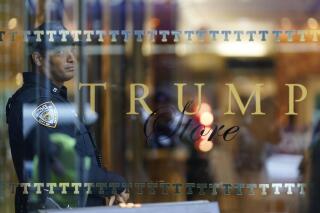Faulty comparisons made between Trump, Clinton payments

A member of the NYPD stands inside of Trump Tower on Wednesday, March 22, 2023, in New York. As a Manhattan grand jury weighs whether to indict former President Donald Trump over hush money payments made on his behalf during his 2016 presidential campaign, social media users are spreading inaccurate comparisons of Trump’s case and one involving former President Bill Clinton in 1998. (AP Photo/Bryan Woolston)
CLAIM: It is a double standard that former President Donald Trump may be indicted over alleged hush money payments to a woman who accused him of sexual encounters, while former President Bill Clinton faced no criminal charges for paying a sexual harassment accuser $850,000.
AP’S ASSESSMENT: False. Clinton and Trump’s cases have key differences, according to legal experts. Clinton’s $850,000 payment to Paula Jones in 1998 settled a civil lawsuit. The payment was public and legal, and the funds did not come from the government, nor did they amount to a campaign contribution. By comparison, the payment in Trump’s case was through a shell company and reimbursed by Trump, whose company logged the reimbursements as legal expenses in the final weeks of his 2016 presidential campaign.
THE FACTS: As a Manhattan grand jury weighs whether to indict Trump over hush money payments made on his behalf during his 2016 presidential campaign, social media users are spreading inaccurate comparisons of Trump’s case and one involving Clinton 25 years ago.
“Bill Clinton paid Paula Jones $850K to go away, I don’t remember the FBI raiding his lawyer’s office,” reads the text on a post being shared widely across social media this week.
“Rules for thee not for me,” wrote another Instagram user who shared the same post on Monday, receiving nearly 4,000 likes. Similar claims were also posted to Twitter by a Republican congressman.
But the claims draw a false comparison between the two cases.
“There is no comparison between these two payments from a legal point of view,” said Kathleen Clark, a law professor specializing in legal and government ethics at Washington University in St. Louis. “The 1998 Clinton-Jones settlement was a settlement of a civil lawsuit. And the settlement was public and was filed in court. In contrast, this payment from Trump to Stormy Daniels was secret.”
She added that another difference is that Trump’s former lawyer, Michael Cohen, pled guilty to violating federal campaign finance laws in connection to the payment. Cohen, now a key prosecution witness, has said Trump was involved as well.
“Trump’s payment was illegal, and later became the basis for a guilty plea and was part of an illegal campaign contribution,” Clark said.
Trump faces a possible indictment over his alleged involvement in the $130,000 payment made in 2016 to the porn actor Stormy Daniels to keep her from going public about a sexual encounter she said she had with him years earlier. Trump denies the encounter and any wrongdoing.
Cohen paid Daniels, whose real name is Stephanie Clifford, through a shell company before being reimbursed by Trump, whose company, the Trump Organization, logged the reimbursements as legal expenses, The Associated Press has reported.
Cohen pleaded guilty to violating federal campaign finance law in connection with the payments. Federal prosecutors say the payments amounted to illegal, unreported assistance to Trump’s campaign, although they declined to file charges against the former president himself
Manhattan District Attorney Alvin Bragg’s team appears to be looking at whether Trump or anyone committed crimes in New York state in arranging the payments, or in the way they accounted for them at the Trump Organization, according to AP reporting.
Nan Hunter, a professor of law emerita at Georgetown University’s law school, said Bragg could potentially charge Trump with falsifying a business record because he has claimed that the money paid to Daniels was a legitimate business expense incurred by the Trump corporation.
“This charge is grounded in usage of corporate funds for a purpose unrelated to legitimate corporate activities, since the underlying issue was not conduct engaged in by the business but the personal actions of Mr. Trump,” Hunter wrote in an email. “In addition, there may be a charge that the purpose of the payment was to affect the outcome of an election through a secret payment in violation of election laws.”
Clinton, meanwhile, agreed to pay his accuser, Jones, $850,000 to drop a sexual harassment lawsuit. He settled out of court in November 1998, about halfway through his second term as president. As part of the settlement, he acknowledged no wrongdoing and offered no apology.
Jones alleged that Clinton, as Arkansas governor in 1991, made a crude advance in a room at a Little Rock hotel when she was a clerk for the Arkansas state government. Her lawsuit was later dismissed by a federal judge.
“Both involve payments for alleged sexual misconduct, but from a legal point of view there’s no comparison between the two,” Clark said. “There’s no indication that the 1998 Clinton-Jones settlement was aimed at influencing the election, in addition it was not secret, it was public.”
Hunter agreed that Clinton’s payment was legally sound. Clinton agreed to settle the case because Jones could have appealed the dismissal, according to Hunter. Under the terms of the settlement, Jones agreed not to appeal the judgment against her.
“There is nothing shady or illegal about two parties settling a case,” Hunter said, adding, “There was nothing secret about the payment and there were never any criminal charges in the case.”
___
This is part of AP’s effort to address widely shared misinformation, including work with outside companies and organizations to add factual context to misleading content that is circulating online. Learn more about fact-checking at AP.
